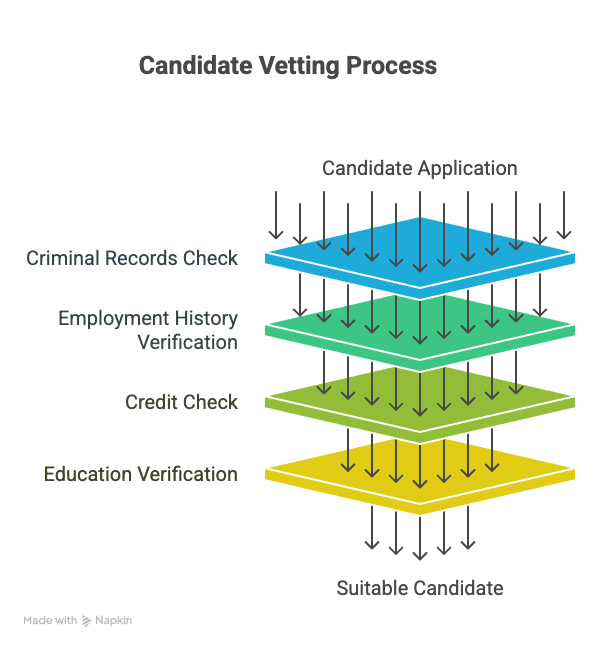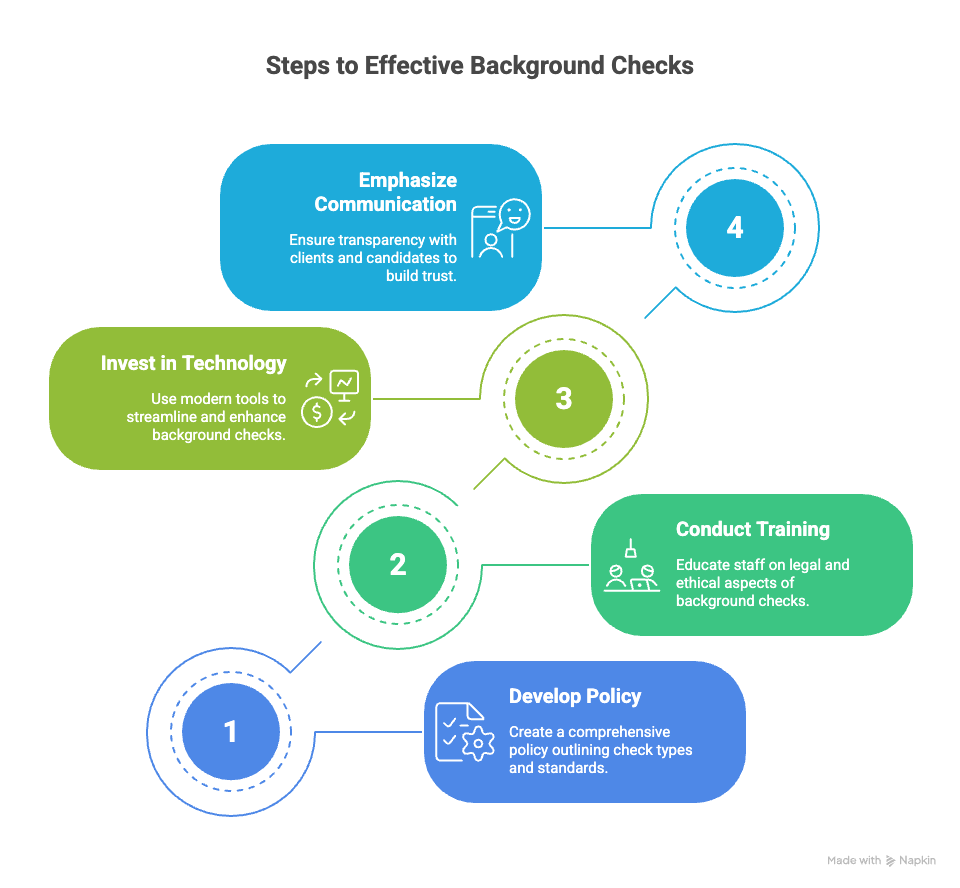In the bustling world of staffing, where agencies match talent with opportunity, ensuring the right fit goes beyond just skills and experience. Enter the critical yet often overlooked component of staffing agency success: background checks. These checks play an indispensable role in safeguarding all parties involvedâclients, candidates, and the agencies themselves. This guide will delve into the myriad reasons why background checks are essential, from minimizing risks of negligent hiring to enhancing workplace safety, all while staying compliant with legal standards like the Fair Credit Reporting Act (FCRA).
Key Takeaways
- Background checks are crucial for staffing agencies to ensure candidates are reliable and honest.
- Compliance with the Fair Credit Reporting Act is essential to avoid legal issues when conducting background screenings.
- Thorough background checks protect staffing firms from negligent hiring and the associated financial and reputational risks.
- Implementing comprehensive background checks improves workplace safety and employee trust.
- Investing in modern screening technology enhances efficiency and accuracy, making your hiring process more reliable.
Introduction
Staffing firms today increasingly rely on background checks to keep operations secure and efficient. These checks are key in ensuring that the candidates presented to clients are the right fitânot just in terms of skills and experience, but also in reliability and integrity. This article dives into exactly why staffing agencies conduct these checks and how they play a crucial role in minimizing risks and maintaining operational standards. In short, background checks have become an essential, must-have element in modern staffing practices. They help maintain operational excellence while minimizing risks, ultimately safeguarding the reputation of both the staffing agency and its clients.
Understanding Staffing Agency Background Checks
Background checks are an in-depth examination of a candidate's past, aimed at verifying the accuracy of their resume and uncovering any potential red flags. For staffing agencies, these checks are crucial. They act as a vetting tool to ensure candidates are who they claim to be and are suitable for the roles they are being considered for.

At their core, background checks involve several key components. Criminal records are often the first stop, revealing any history of unlawful behavior that might be relevant for a potential employer. Employment history is verified to confirm past job titles and tenures, ensuring the candidate's experience aligns with their claims. Credit checks might be done for roles involving financial responsibilities, shedding light on a personâs reliability and judgment. Education verification confirms that candidates hold the degrees and certifications listed on their resume.
While some might view it as cumbersome, the integrity of the hiring process relies on these checks. Consider the cost of a bad hire: lost productivity, damaged reputation, and potential legal liability. Are you prepared to face these risks? As a staffing agency professional, ensuring thorough background checks is your safeguard against such mishaps. Itâs not just about ticking a boxâit's ensuring your client receives a candidate who can truly meet their needs without surprises down the road.
Legal Considerations: FCRA Compliance
The Fair Credit Reporting Act (FCRA) sets the standard for how staffing agencies can obtain, handle, and use consumer reports, including background checks. Enacted to ensure accuracy, fairness, and privacy, the FCRA applies whenever agencies procure reports to evaluate candidates for employment.
To comply, agencies must follow several clear steps. First, they need written permission from candidates before running a background check. This is not optional. You should make this process transparent and straightforward. You'll also need to provide candidates with a summary of their rights under the FCRA.
If a report reveals information that might affect hiring decisions, you must follow the pre-adverse action protocol. This includes providing a copy of the report and allowing candidates to explain or dispute inaccuracies. Failure to adhere to these requirements can lead to costly lawsuits and damage your agencyâs reputation.
Consider the case of Spokeo, Inc. v. Robins, where the Supreme Court ruled that mere inaccuracies in reports, without proving actual harm, could not warrant legal claims. Yet, itâs a reminder to stay vigilant. Inaccuracies can lead to significant disputes and costs, and being proactive about compliance is non-negotiable.
Understanding these FCRA requirements is not just about legal adherenceâit's about ensuring fairness and accuracy for candidates and protecting your agency from legal backlash. Is your staffing firm ready to rigorously follow these guidelines?
The Risks of Negligent Hiring
Negligent hiring happens when an employer fails to conduct due diligence during the hiring process, resulting in harm due to an employee's actions. Imagine you hired someone with a history of fraud without a proper check, and later they commit financial misconduct. That's negligent hiring. The fallout from such lapses can be severe, including lawsuits and reputational damage.
Data from 2018 shows that employers in the U.S. paid over $700 million in settlements tied to negligent hiring claims. This figure illustrates the financial risk staffing firms face without thorough background checks. The legal repercussions, along with lost clients and tarnished brands, are just part of the equation.
Background checks serve as your first line of defense. They provide insights into a candidate's past, helping you avoid costly mistakes. By checking criminal records and verifying employment history, you reduce the chances of hiring someone with a questionable past. This proactive approach not only shields your agency from liability but also protects your clients and their employees.
Ask yourself: Is the risk of skipping a background check ever worth it? A structured screening process minimizes legal exposures and fosters trust with your clients. After 20 years in this field, I've seen that the effort you put into proper checks pays off by significantly reducing the chances of negligent hiring.
Enhancing Workplace Safety
Background checks are a tool for creating safer work environments. When you screen candidates thoroughly, you reduce the chances of hiring individuals who might pose risks. Imagine a company neglecting this step and hiring an employee with a violent past for a position that involves high customer interaction. The potential for workplace incidents would be significantly higher.
Data supports this preventative measure. A study by the Society for Human Resource Management (SHRM) found that organizations conducting background checks report fewer safety-related incidents. In fact, businesses with comprehensive screening processes saw a marked decline in workplace violence and theft.
Consider an example from a logistics company. They implemented rigorous background checks after a few incidents involving employee theft. Following the change, not only did thefts decrease, but there was also a noticeable improvement in overall staff morale. Employees felt more secure knowing that their coworkers had been vetted, fostering a sense of trust and safety within the workplace.
Implementing background checks isn't just about preventing obvious risks. It's about creating a sense of security and trust among your team. When people feel safe, productivity often increases. They perform better when they donât worry about their personal safety or the reliability of their colleagues. In essence, a secure workplace often correlates with a thriving one. Are you doing enough to ensure your workplace is as safe as it can be?
Social and Ethical Dimensions
When running background checks, consider the delicate balance between privacy and safety. You have a responsibility to protect your clients and other employees while respecting candidates' personal history. Sometimes, there is an inherent tension between the two.
Privacy is a big part of this process. No one wants to feel like their life is under a microscope. However, workplace safety necessitates thorough screening. The challenge lies in ensuring that you respect individual privacy without compromising safety standards.
Discrimination is another concern. Basing decisions on a criminal record or credit history can unintentionally lead to biases. To counteract this, focus on the relevance of findings to the position at hand. For instance, a past misdemeanor may not reflect a personâs ability to perform a job safely and effectively.
Fair treatment is crucial. Use consistent criteria for all candidates. This approach not only helps avoid discrimination but also builds trust with candidates, clients, and within your agency. Consistency and fairness in checks can enhance your credibility.
Finally, background checks are tools for building trust. When done right, they reassure clients of their hiring decisions and enhance candidate confidence in their new role. This trust establishes a foundation for long-term relationships, essential for any staffing firmâs success.
Do you find your current practices uphold these social and ethical considerations? Or is there room to fine-tune your approach to preserve fairness and build trust?
Technological Advances in Employment Background Screening
The background check industry has seen a surge in technological innovation. Modern tools now make it easier and faster to gather and analyze data. Online databases, automated systems, and AI-driven tools are replacing manual processes. They simplify screening and help catch red flags that might otherwise be missed.
Efficiency has dramatically increased with these advancements. Consider AI algorithms that swiftly cross-reference data from various sources. What once took days, now takes hours, sometimes minutes. Digital platforms allow for instant updates, keeping you informed every step of the way without any lag.
The future promises even more exciting developments. Biometric checks might soon become standard, adding another layer of security and accuracy. Machine learning could evolve to predict potential employment issues before they arise. The tools and processes in the pipeline hint at a future where background screening is not just faster, but smarter.
Are you ready to embrace these changes in your staffing firm? The right technology not only keeps you competitive but also enhances the reliability of your hiring process.
Actionable Takeaways for Staffing Firms
For staffing firms, integrating effective background checks into your operations requires commitment and strategy. Start by incorporating these best practices into your routine.
Developing a policy should be your first move. A comprehensive background screening policy sets the standards for checks. This policy should outline the types of checks conducted, such as criminal records, employment history, and education verification. Clarity here prevents misunderstandings and ensures consistency in your approach.
Training is crucial. Educate your staff about the legal and ethical dimensions of background checks. This includes understanding FCRA compliance and managing biases. Regular training sessions can help your team stay informed about current laws and best practices, reducing the risk of legal issues.
Invest in technology for efficiency. Modern tools streamline background checks, speeding up the process without sacrificing thoroughness. Consider software that integrates various screening components, providing an all-in-one solution to save time and resource investment.
Finally, emphasize communication with your clients and candidates. Transparency builds trust. Explain your screening processes clearly, highlighting how they protect all parties involved. This transparency strengthens client relationships and reassures candidates of fair treatment.

Implement these strategies to make background checks a reliable and effective component of your operations.
Resources
Tapping into the right resources can make your background screening process more efficient and trustworthy. Internally, ensure your team is cross-trained on the essentials of background checks. Regularly update them with fresh insights and guidelines. This keeps your approach consistent and ensures all bases are covered.
Externally, don't hesitate to utilize industry standards from recognized bodies. The Professional Background Screening Association (PBSA) offers a wealth of resources and standards that can help align your practices with industry expectations. Their certifications can provide a framework for maintaining high-quality screening processes.
Online resources such as blogs from industry experts can also add immense value. For instance, GCheckâs blog is an excellent source for the latest trends and practices in background screening.
By integrating these resources, you not only streamline your operations but also bolster your credibility with clients and candidates. Are you leveraging both internal and external resources to enhance your screening process?
Conclusion
Background checks are vital to the success of staffing firms. They reduce risks, ensure compliance, and enhance safety. Solid screenings prevent negligent hiring, and compliance with the Fair Credit Reporting Act is essential. Thorough background checks help build trust and maintain a firm's reputation. Staffing agencies must prioritize these screenings, integrating them into their processes. By doing so, firms protect their clients, candidates, and themselves. Make background checks a key part of your strategy for operational excellence. Prioritize them in your workflow and watch your agency thrive.
Frequently Asked Questions (FAQs)
Are Background Checks Legally Required for Staffing Agencies?
Background checks are not universally required by law for staffing agencies. However, some industries or positions may have specific legal obligations. It's essential to be familiar with local, state, and federal regulations that might apply.
How Do Background Checks Improve Workplace Safety for Staffing Firms?
Background checks help ensure that employees placed by staffing agencies have a clean record, reducing risks related to theft, violence, or misconduct. This practice builds trust and contributes to a safer work environment for both clients and employees.
What Background Checks Are Most Important for Staffing Agencies?
Key checks include criminal records, education verification, employment history, and reference checks. Depending on the job, additional checks like credit reports or driving records may be necessary.
How Much Do Background Checks Cost for Staffing Firms?
The cost varies depending on the depth and type of checks. On average, you might spend anywhere from $20 to $100 per check. It's crucial to budget accordingly and consider the value of ensuring employee integrity and client trust.
What Are the Consequences of Not Conducting Background Checks?
Without proper checks, you risk placing individuals with problematic histories. This could lead to workplace safety issues, legal liabilities, and damage to your agency's reputation.
What Industries Require More Extensive Background Checks?
Industries like healthcare, finance, childcare, and transportation often require more thorough background checks due to the sensitive nature of the work.
How Long Do Background Checks Typically Take?
Most background checks take a few days to a week. However, if there's a need for deeper investigation, it might take longer. Timely communication with clients and candidates is crucial during this process.
Can Candidates Dispute Information Found During a Background Check?
Yes, candidates can dispute inaccuracies. The Fair Credit Reporting Act (FCRA) provides candidates the right to challenge and request corrections to any incorrect information found during a background check.
Do Candidates Need to Consent to Background Checks?
Yes, candidates must provide written consent before a background check can be conducted. Transparency about what will be checked and why can foster trust and cooperation.
What Should Staffing Agencies Do if a Background Check Reveals Negative Information?
Evaluate the relevance of the negative information to the job role. Many employers adopt a fair chance policy, giving candidates the opportunity to explain any red flags before making a hiring decision.
Definitions
Background Check
A background check is a process used to verify a candidateâs criminal history, education, employment record, and other relevant data. Staffing firms conduct these checks to confirm that a candidate is truthful and reliable. For example, a discrepancy in job titles or unexplained employment gaps might raise concerns. This step helps staffing agencies present dependable candidates to clients and avoid potential risks.
FCRA Compliance
FCRA compliance means following the Fair Credit Reporting Act when using consumer reports for employment decisions. Staffing firms must get written permission from a candidate before pulling a report, share the report if it may impact hiring, and give the candidate a chance to respond. Not following these steps can lead to lawsuits and loss of trust. Are your procedures fully compliant?
Negligent Hiring
Negligent hiring happens when an employer fails to check a candidateâs background and the person later causes harm. For example, hiring someone with a criminal history of theft for a role involving cash handlingâwithout a proper checkâcan lead to major liabilities. Staffing firms face legal, financial, and reputational damage when they miss this step. Are you taking all reasonable steps to avoid negligent hiring?
Employment History Verification
Employment history verification is the process of confirming a candidateâs previous job titles, dates of employment, and sometimes reasons for leaving. This step helps ensure that the candidateâs work background matches what they claim on their resume. For instance, confirming that a candidate really held a management position helps clients make more informed decisions. Are you verifying details or just taking resumes at face value?
Workplace Safety
Workplace safety connects directly to who you hire. Background checks help identify individuals who may pose a risk to coworkers or clients. For staffing agencies, screening supports a safer environment by reducing the chances of incidents like theft, violence, or fraud. When employees feel safe, they tend to be more confident and productive. Are your hiring practices contributing to a secure workplace?
Here are authoritative studies and surveys related to employment background checks and staffing, along with recommendations for specific sections in your article where they can be inserted for added credibility. Each study or statistic is accompanied by a link for reference.
References
- PBSA statistics and trends: https://gp1.com/heres-a-few-background-check-statistics-for-2025/
- Shortlister background check statistics: https://www.myshortlister.com/insights/background-check-statistics

GCheck Editorial Team
Meet the GCheck Editorial Team, your trusted source for insightful and up-to-date information in the world of employment background checks. Committed to delivering the latest trends, best practices, and industry insights, our team is dedicated to keeping you informed.
With a passion for ensuring accuracy, compliance, and efficiency in background screening, we are your go-to experts in the field. Stay tuned for our comprehensive articles, guides, and analysis, designed to empower businesses and individuals with the knowledge they need to make informed decisions.
At GCheck, we're here to guide you through the complexities of background checks, every step of the way.





